Karma is Not Fate: Why Karma is Empowering. Why do bad things happen to good people? How can we escape the wheel of suffering?
Why is Karma empowering?
One way of viewing Karma is as an aggregate of all of our actions, thoughts, words, dreams, desires into a user-controlled version of fate — that is you control your fate instead of some invisible higher being.
Another concept of karma, aligned to both mystical sciences and scientific mysticism (Quantum Physics), is that karma are the empowering energy connections that bind us to the universe through all of time and space. Then, there is the simplified notion of karma: every deed has a consequence. Even the most basic karmic concepts still align well with basic physics: for every action there will be an equal and opposite reaction.
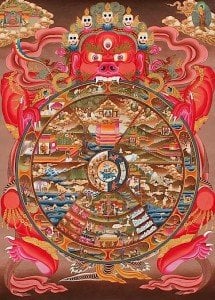
Buddhist belief in karma is rooted deeply in teachings on Samsara, the Buddhist Wheel of Life and the important concept of attachment as a root cause of suffering. You don’t have to literally believe in rebirth, the principal of cause and effect influencing future suffering, to appreciate the elegance of karma as a concept. This is beautiful illustrated in various stunning and frightening depictions of the wheel of suffering (top image.)
Why Karma is actually empowering
Karma is an empowering concept, unlike the belief in fate that grew out of ancient Greece, or the Biblical belief story of Job that illustrates how helpless man is against the will of God. With Karma, we are in the “driver’s seat” not a god or some whimsical “fates” playing around with our destiny. The formula is an easy one. Good deeds and merits bring auspicious consequences; negative deeds result in negative outcomes — in the end. The “result” is rarely immediate, but it is certain. The good news — we can control our own outcomes.
Buddhism teaches Karmic consequences. Buddhism also has remedies. For example, mindfulness can be a remedy for negative karmic actions — if we are mindful, we will not trigger negative actions. Mindfulness, or staying in the present, is a remedy for clinging. If we don’t dwell on happy or sad memories, what is there to adhere to? If we don’t hope and dream about a better future, what is there to be worried about? Understanding karma, likewise helps us move past attachment to ourselves, and generates a genuine compassion for everyone else.
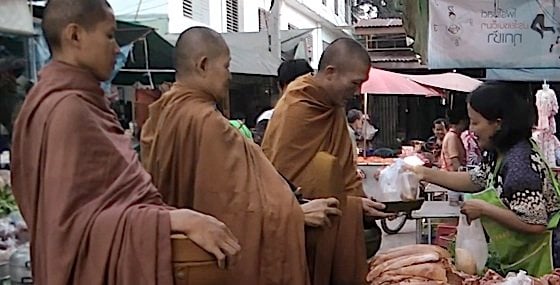
Karma is not fate
If you believe in fate, you believe we are helpless. This is not a Buddhist concept. Buddhism, ultimately is a very practical, and also individual-centric practice in the sense that we all have the potentiality to be Buddhas or Bodhisattvas. And, we achieve that through adhering to various precepts which also help us overcome both clinging and karmic consequences. If we follow the precepts, karmic consequences are positive.
Buddha, ultimately, taught a self-help path to Enlightenment. Understanding karma, we can develop many important insights. Living mindfully with Karma, we can rapidly move along the self-path to Enlightenment. Siddartha Gautama Buddha showed us that understanding karma is empowering. Buddha gives us hope that no matter what negative karma we have accumulated in this, and previous, lives, it can be overcome.
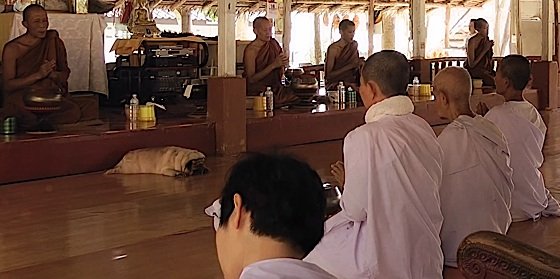
The EightFold Path and Four Noble Truths
The Eightfold Path is Buddha’s prescription for an end to suffering. Shakyamuni Buddha taught the “middle way”, avoiding extremes, based on the Four Noble Truths:
- Life is suffering.
- The origin of suffering is wrong knowledge, which results in misunderstanding (ignorance), attachment (craving), and aversion.
- The cessation of suffering is attainable.
- The Eightfold Path leads to the cessation of suffering.
The Eightfold Path, bound up in the important concept of karma, teaches two wisdom, three ethical and three mental development methods for generating positive karma and escaping the Wheel of Suffering:
- Right View
- Right Intention
- Right Speech
- Right Action
- Right Livelihood
- Right Effort
- Right Mindfulness
- Right Concentration
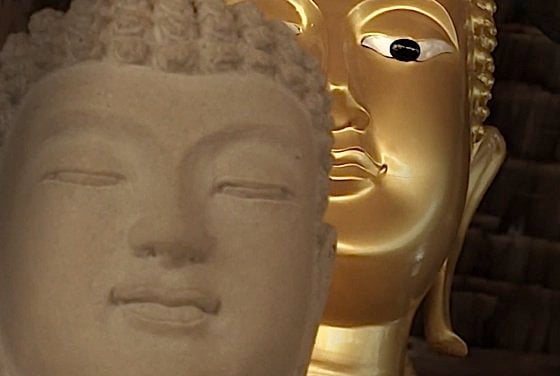
Types of Karma
Although there are slightly different interpretations of karmic types, varying somewhat from Vedic belief to Buddhist, the overall concept is similar across most people who practice with karma. Depending on your teacher or belief system there are basically four types of karma:
- Sanchita Karma, which is the aggregate total of all of our action karma in previous lifetimes, which set the stage for our condition in the current life.
- Praradha Karma, our past karmic consequences in the past actions of our current lifetime. Some practices, such as mantra practice, Vajrayana practice, and other advanced practices can actually help mitigate this karma, even though traditionally it is said that we can’t do much to alter events as a consequence of Praradha karma. Good deeds or positive karma can also help offset negative past karma.
- Agami Karma are the actions in our present lifetime that will affect our future lives or incarnations — the Christian concept of “as you sow, so shall you reap” but advanced across future lives. Positive actions, following the precepts, charity, compassion, and practice all accumulate for optimum karma in future incarnations.
- Kriyamana Karma is the most intense form of karma, the one we see in our daily lives, where our current actions (good and bad) result in immediate consequences. Negative actions may result in retribution. Positive actions may, in this lifetime, be returned in kind. It is also know as immediate karma.
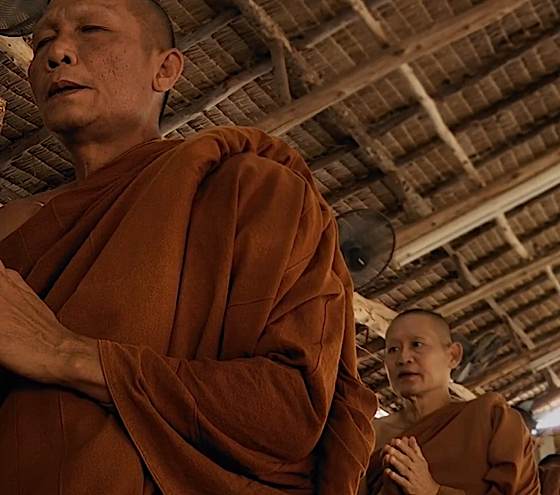
Working with Karma
The very concept of karma is encouraging, positive and uplifting, even if you come to realize you’ve accumulated negative karma. The very nature of karma shows us the remedy, both in this life and future lives. Truly repentant people who accumulate merit and good deeds without clinging to pride of accomplishment, can very well take charge of their positive future karmic outcome.
A mantra practice, which also helps create focused mindfulness, can be a positive practice in remedying negative karma. Vajrasattva purification mantras, or any Yidam mantra, can be most effective if mindfully practiced. Compassionate acts, charity, avoiding killing (including the practice of eating meat, and mindfully avoiding killing insects) all help move karma from the deficit column, gradually but genuinely, into the asset column.
Unlike fate, karma gives us hope, in this lifetime, and almost immediately, of a better life and lives for everyone.
Ultimately, karma is empowering and inspiring.
6 thoughts on “Karma is Not Fate: Why Karma is Empowering. Why do bad things happen to good people? How can we escape the wheel of suffering?”
Leave a Comment
More articles by this author

Profound simplicity of “Amituofo”: why Nianfo or Nembutsu is a deep, complete practice with innumerable benefits and cannot be dismissed as faith-based: w. full Amitabha Sutra

“Torches That Help Light My Path”: Thich Nhat Hanh’s Translation of the Sutra on the Eight Realizations of the Great Beings

The Science of Mantras: Mantras Work With or Without Faith; Research Supports the Effectiveness of Sanskrit Mantra for Healing — and Even Environmental Transformation
Search
Latest Features
Please support the "Spread the Dharma" mission as one of our heroic Dharma Supporting Members, or with a one-time donation.
Please Help Support the “Spread the Dharma” Mission!

Be a part of the noble mission as a supporting member or a patron, or a volunteer contributor of content.
The power of Dharma to help sentient beings, in part, lies in ensuring access to Buddha’s precious Dharma — the mission of Buddha Weekly. We can’t do it without you!
A non-profit association since 2007, Buddha Weekly published many feature articles, videos, and, podcasts. Please consider supporting the mission to preserve and “Spread the Dharma." Your support as either a patron or a supporting member helps defray the high costs of producing quality Dharma content. Thank you! Learn more here, or become one of our super karma heroes on Patreon.
Josephine Nolan
Author | Buddha Weekly
Josephine Nolan is an editor and contributing feature writer for several online publications, including EDI Weekly and Buddha Weekly.
















The Buddha never said the origin of suffering is attachment, the origin is fundamental ignorance of the way things exist. From that attachment and aversion arise. You can suppress attachment all you want but if you don’t eliminate fundamental ignorance you will not be free from suffering.
That was enlightening 🙂 Thank you matt 🙂
I would like to know more about Budhism
This was a great article on karma Josephine. I had no idea that there were different types of karma. Now I have new terminology to research. Thank you for that.
I believe intention plays a big part in karma. It is the intentions behind our actions that truly matter. Sometimes the outcome of our actions do not go as planned, but if our intentions are pure, our karma will be too.
Greg
“The role that kamma plays in the awakening is empowering. It means that what each of us does, says, and thinks does matter—this, in opposition to the sense of futility that can come from reading, say, world history, geology, or astronomy, and realizing the fleeting nature of the entire human enterprise. The awakening lets us see that the choices we make in each moment of our lives are real, and that they produce real consequences. The fact that we are empowered also means that we are responsible for our experiences. We are not strangers in a strange land. We have formed and are continuing to form the world we experience. This helps us to face the events we encounter in life with greater equanimity, for we know that we had a hand in creating them. At the same time, we can avoid any debilitating sense of guilt because with each new choice we can always make a fresh start.”
― Thanissaro Bhikkhu, Refuge: An Introduction to the Buddha, Dhamma, & Sangha
Ur pretty leng thanks matt I wanna be the Buddha tooo!!!